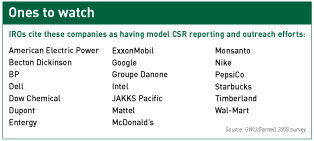How big is the ‘green’ shareholder movement? Some firms have started targeting socially conscious investors.
Judging by the stream of new sustainability reports from companies including Dell and Allianz, it’s clear that more firms are reporting their progress on CSR. But is it getting them credit from investors? That’s the question IR consultant Larry Parnell and a team of his graduate students set out to answer.
It’s a natural line of inquiry, given what’s happening in the consumer market. ‘Bio-degradable packaging, hybrid cars, ethanol, recycling: being ‘green’, even in this uncertain economy, is all the rage,’ says Parnell, an associate professor at the George Washington University (GWU).
But while Madison Avenue and its global equivalents have been highly effective at using sustainability to sell products, it is debatable whether IROs have the same tool as a way to attract investors. According to data compiled by the GWU team, only about 30 percent of companies even publish a CSR report.
IROs generally don’t use CSR issues in their pitches to investors. The GWU survey, conducted in association with IR magazine and drawing 41 responses, suggests the interest might not be there. For example, CSR issues ranked seventh and last as investor concerns against more traditional considerations like earnings, product quality and quality of management in the survey. This is consistent with a 2007 report from Rivel Research Group, in which investors rank CSR last among ‘key evaluative factors’ when making investment decisions.
No management buy-in
The interest of senior management in CSR is also low when compared with more traditional business objectives. IROs in the survey report that management sees earnings as paramount, followed by innovation and product quality. ‘Environmentally friendly business practices and CSR are given meaningful weight by management once the primacy of other categories is established, however,’ Parnell says.
Lack of interest in CSR on these two sides translates to 90 percent of IROs in the survey reporting that they have no specific marketing program for socially responsible investors. Yet the Social Investors Forum estimates that, between 1995 and 2007, total dollars under professional management in SRI funds grew from $639 bn to $2.71 tn. ‘This is a substantial market for IROs to overlook,’ Parnell says.
Not all companies are ignoring the opportunity. Energy giant BP, for example, makes a big effort to tell its sustainability story, honing it in 2007 by producing an eight-page printed summary of its CSR efforts derived from a longer, more detailed 40-page sustainability report available on the web.
‘Our research has shown that high-net-worth US private investors are increasingly using this type of report to help in their investment decision making,’ says Rachael MacLean, BP’s vice president of IR for North America.
BP also specifically targets socially responsible investors. ‘We have found that holding strong relationships with these investors helped BP during a period when we experienced negative safety and environmental issues,’ MacLean explains.
Timothy Smith, director of SRI at Walden Asset Management, a division of Boston Trust, says he sees numerous examples of good shareowner outreach on CSR-type issues, with Coca-Cola, Pfizer, Dell and Intel among the exemplars. In the last year, Smith has seen a new CSR trend: executive compensation roadshows with investors.
Andrea Moffat, director of corporate programs at Ceres, a network of investors and public interest groups focused on sustainability, says she even sees CSR issues gaining traction with traditional investors. ‘It’s early days, but we are seeing a lot of research reports on these topics,’ she says. ‘There were about 120 reports covering climate change last year alone.’
Quality control
IROs, however, seem unaware of where to look for model CSR efforts. An open-ended question in the GWU survey about which companies in their sector – or elsewhere – were CSR leaders had numerous IROs replying ‘don’t know’, ‘can’t think of one’ or ‘would love to know’. Other responses indicated skepticism, with one stating ‘PR and advertising do not constitute IR’ and ‘those who trumpet CSR are not necessarily effective at implementation’.
The criticism doesn’t give everyone pause, though. ‘Experienced IROs and investors know the difference between ‘puffery’ and a real commitment, and we understand that ‘effective implementation’ of a corporate strategy must be achieved in order to be reflected in market value,’ Parnell notes.
Even if IROs can’t or aren’t yet focusing on the SRI investment case, many feel it affects performance, and should be of interest to investors. ‘CSR performance is like showering every day,’ says Brian Rivel, president of Rivel Research. ‘You don’t get credit for it, but if you don’t do it, over time people will react.’
Graduate students Megan Trainer, Nicole Nigh and Julianne Perry assisted in the research for this article.










